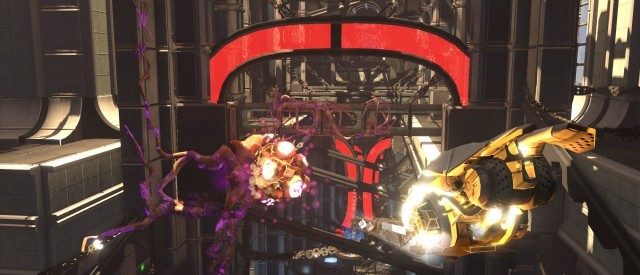Things were shaky for Retrovirus developer Cadenza Interactive for awhile. The Kickstarter campaign they launched for their cooperative six-degrees-of-freedom shooter failed due to burnout, not enough coverage, an unknown genre, who's to say, really. The reasons why don't matter as much as the fact that it did and that it didn't stop them. The small development team managed to press on, thanks to early copy sales through GameStop and the support of 6DoF fans, and released the game on Steam last month. We spoke with Matt Enright, one of the lead developers on the game, about how they managed it all, what challenges they faced, and what's next for them.
Co-Optimus: How's everything been since the release? Had any time to relax and catch up on sleep?
Matt Enright: The release crunch was replaced with a post-release support rush, but we ironed out many of the inevitable issues people reported within the first week. Now that we can focus on additional content, we can also relax the pace and catch up on everything that was put aside for the last few months, sleep included.
Co-Optimus: Let's just dive right into the big topic of this game's development: the failed Kickstarter. Back when we spoke with Dylan about the game and the Kickstarter, you all had plans to work with GameStop to help spread word about it. How did that go?
Matt: The Kickstarter campaign failed its target, but ended up helping us accomplish our main goals indirectly. The publicity push introduced the game to many people, especially the thousand backers who have continued to receive project updates. GameStop's support in selling the alpha allowed eager fans to gain early access to the game and give us feedback. Finally, investors discovered us and helped buy time to polish the game instead of releasing too early.
Co-Optimus: Would that have been enough had it not been for the surprising support from a fan? Were there other plans in place? What was the situation like for Cadenza?
Matt: We had already been working on Retrovirus for two years when the Kickstarter campaign went live, so we were prepared to finish the game, even if it meant some serious content and feature cuts. The support we received from fans, friends, and family allowed us to make the final changes that would otherwise have been patched in much later, without which many players would not have the intended experience.
.jpg)
Co-Optimus: During that time, was the focus just to get as much done as possible and hope you could get something close to complete to release?
Matt: Exactly. We are passionate about what we do and will always find a way to go on making games. Many companies have failed by not being willing to make the sacrifices that are needed to follow through and finish their projects. We are fortunate to be surrounded by people who understand and support our efforts.
Co-Optimus: I'm glad that you all were able to get it done and released, and it definitely seems to be getting some good praise. We've certainly been enjoying the co-op aspect. What lessons did you take away from Sol Survivor when it comes to developing a co-op game?
Matt: In our experience, games always become better when players can team up to face the challenges. Players love to express their gaming triumphs, and it's all the better when someone was there to share and experience it. For that reason, it was important to ensure that the whole campaign could support multiple players, rather than relegating it to alternate levels. We did learn that some co-op modes are better than others, however. The option to split turret and support duties between players in Sol Survivor didn't give a complete experience to either player, so there are no artificial limitations to player abilities in Retrovirus's co-op mode.
